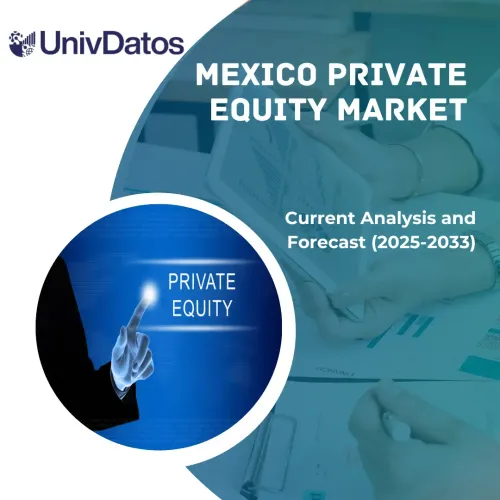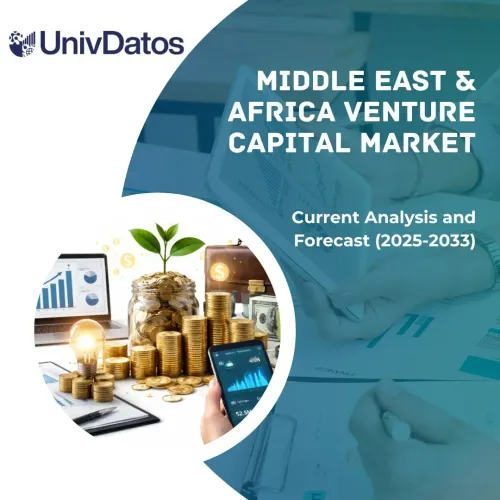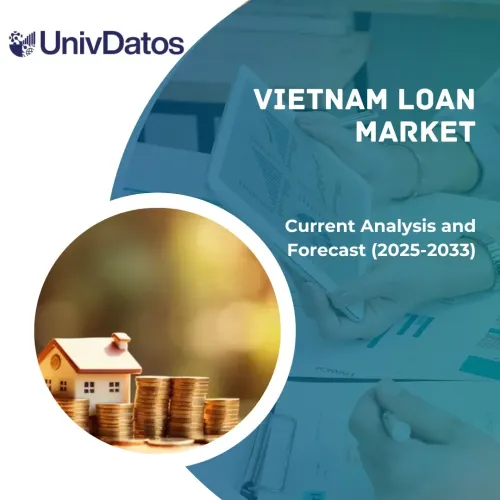- Home
- About Us
- Industry
- Services
- Reading
- Contact Us
Mexico Private Equity Market: Current Analysis and Forecast (2025-2033)
Emphasis on Size of Enterprise (Micro, Small, Medium, and Large); Sector (Healthcare, Financial Services, Consumer Goods, Energy & Infrastructure, Technology, Manufacturing, and Others); and Region
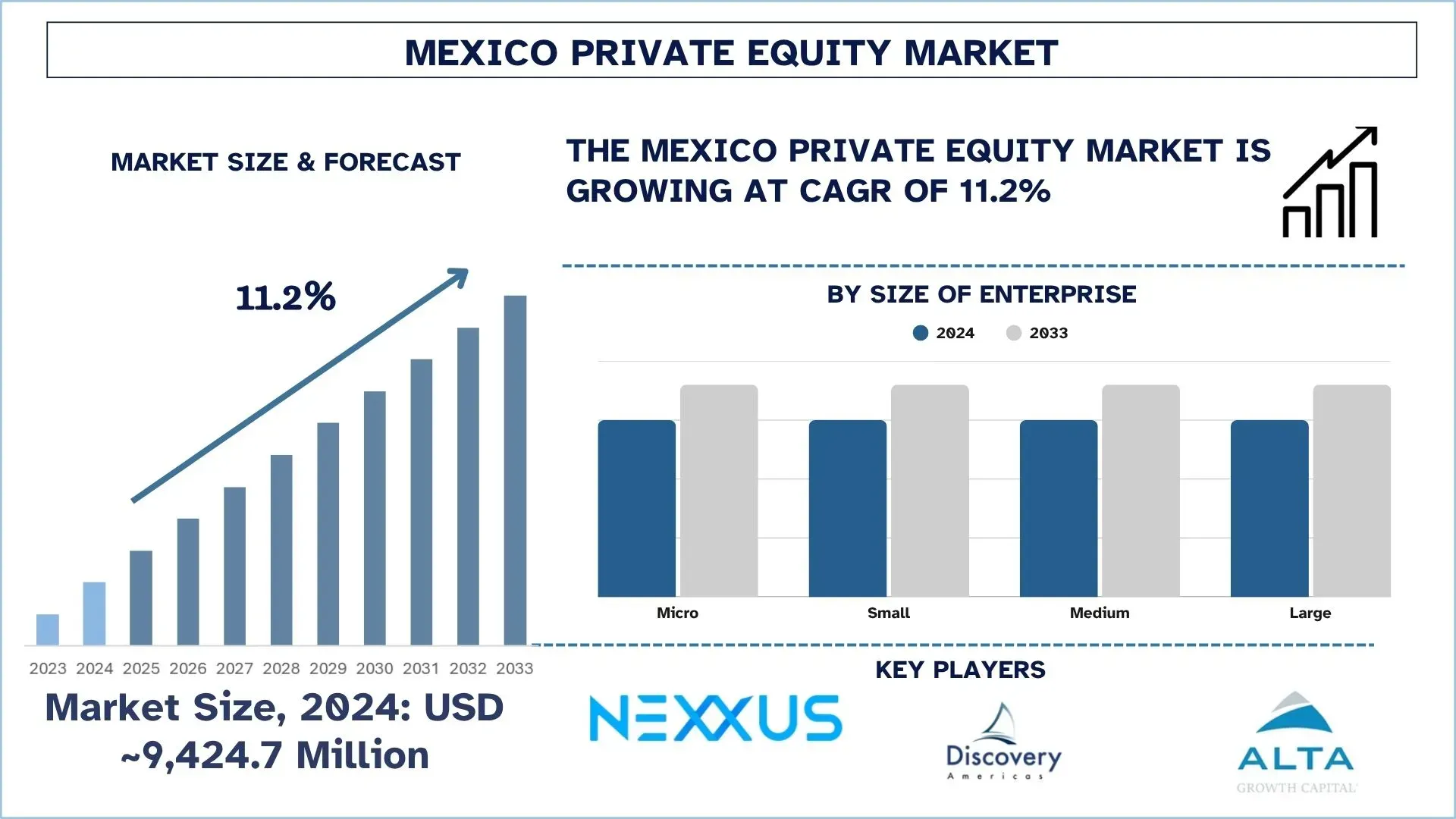
Mexico Private Equity Market Size & Forecast
The Mexico Private Equity market was valued at USD ~9,424.7 million in 2024 and is expected to grow to a strong CAGR of around 11.2% during the forecast period (2025-2033F), owing to Mexico’s strategic nearshoring potential, attracting investment in manufacturing, logistics, and mid-market enterprises.
Mexico Private Equity Market Analysis
The Mexican private equity (PE) market forms an important part of the Latin American investment ecosystem; it has a strong mix of local and international investment potential to offer to investors. The market mainly consists of investments in non-publicly traded companies in sectors, which include industrial manufacturing, logistics, fintech, healthcare, real estate, and consumer goods. The PE firms located in Mexico usually work on buyouts, growth equity, venture capital, and private credit transactions. The market is maturing gradually, and this has been enabled by, among other things, the economic diversification of the country, the young, expanding population, and the evolution of the local institutional investors, including pension funds (AFORES).
In Mexico, digital financial services and fintech represent the fastest-growing category in the overall private equity setting, as the number of underbanked individuals, mobile-first businesses, and an investor base to front financial inclusion approaches is huge. Such fast-growing platforms still command a lot of investment money as they are vastly expanding and exploiting the regulatory exposure and changes in technology acceptance.
High-value transactions in logistics and industrial real estate have been spurred by the nearshoring trend; TC Latin America Partners recently spent around $150 million in five industrial locations close to the U.S. border. Hyatt's premium presence in Mexico and the Caribbean was reinforced in February 2025 when it paid $2.6 billion to acquire Playa Hotels & Resorts. Fintech is still at the forefront of startups: in March 2025, fintech Tala obtained a $150 million debt facility to enhance lending to SMEs, while in 2024, established digital companies like Clip and Justo received substantial funding, representing a regional 26% increase in capital.
Mexico Private Equity Market Trends
This section discusses the key market trends that are influencing the various segments of the Mexico Private Equity market, as found by our team of research experts.
Nearshoring Recalibration
Nearshoring has always been the major strategic determinant when investing in Mexico through private equity, but current events have brought some caution. On the one hand, manufacturers and players in the field of logistics continue to find it very attractive to move supply chains closer to the U.S., but on the other hand, ambiguity related to U.S. trade and tariff policies in 2025 has led some investors to show more caution. Some of the private equity firms are taking short-term or staged investing plans as opposed to long-term, infrastructure-intensive projects by leasing plants instead of constructing them, or deferring wholesome acquisitions through bridge financing. Such recalibration is an indication of a more balanced opinion that, despite the long-term potential known to all about the geographic advantage of Mexico, strategic threats to geopolitical stability in the short term were considered.
Tech & Fintech Dominance
The most active and attractive area of technology lies in fintech in Mexico. The industry contributed to a substantial increase in the startup investments in the region in 2024 (up 26 percent). It is at the forefront with digital payments, neobanks, lending platforms, and embedded finance solutions; there is high growth potential in Mexico, given that there is a large population that is unbanked and whose preferences are mobile-first. The startup techs that are venture-backed, such as Clip, Konfio, and Stori, have seen companies take in multi-million-dollar rounds and have also created an increase in the involvement of private equity in late-stage tech transactions. Investments in digital transformation that the economy is witnessing in various sectors and industries, such as retail, medical, etc., are making technology a staple in the PE portfolio.
Mexico Private Equity Industry Segmentation
This section provides an analysis of the key trends in each segment of the Mexico Private Equity market report, along with forecasts at the regional and state levels for 2025-2033.
The Medium Size Enterprises held the dominant share of the Mexico Private Equity market in 2024.
Based on Size of Enterprise, the market is segmented into Micro, Small, Medium, and Large. Among these, the Medium segment is leading the market. The main push behind the medium-sized enterprise within the Mexican sphere of private equity is that they have a high growth DP and augmented formalization. Such companies are not in the early risk period and have consistent cash flows and scalable models, which is why they become good targets to invest in. Besides, the medium enterprises are also getting increasingly high standards of governance, digital applications, and financial reporting, which improves their external capital potential. These companies are considered by the private equity firms as the best platforms to expand into new markets or verticals, as Mexico undergoes the process of economic decentralization and diversification in sectors. Maturity due to an established operation with the potential to maintain and grow is also a desirable feature that makes medium-sized companies a key target for the local and cross-border PE investors.
The Technology segment is expected to grow with a significant CAGR during the forecast period (2025-2033) of the Mexico Private Equity Market.
Based on the Sector, the market is segmented into Healthcare, Financial Services, Consumer Goods, Energy & Infrastructure, Technology, Manufacturing, and Others. Among these, Technology is the largest contributor to the Mexico Private Equity industry. The main motive force of the technology sector of the Mexican private equity market is the high rate of digitalization of the Mexican population and the underdevelopment of the technological environment, which is promising with regard to scalable innovation. Mexico is an extremely young nation with a broad population base and tremendous growth in fintech, e-commerce, software-as-a-service (SaaS), and digital health, among other sectors. The digital financial inclusion, which is supported by governments, and the improvement in mobile and internet penetration have provided a conducive environment that favors tech startups and scaleups. The attraction of this segment to the private equity and venture capital firms is related to the high-growth outlook, asset-light business strategies, and high demand for tech-driven services among consumers and businesses.
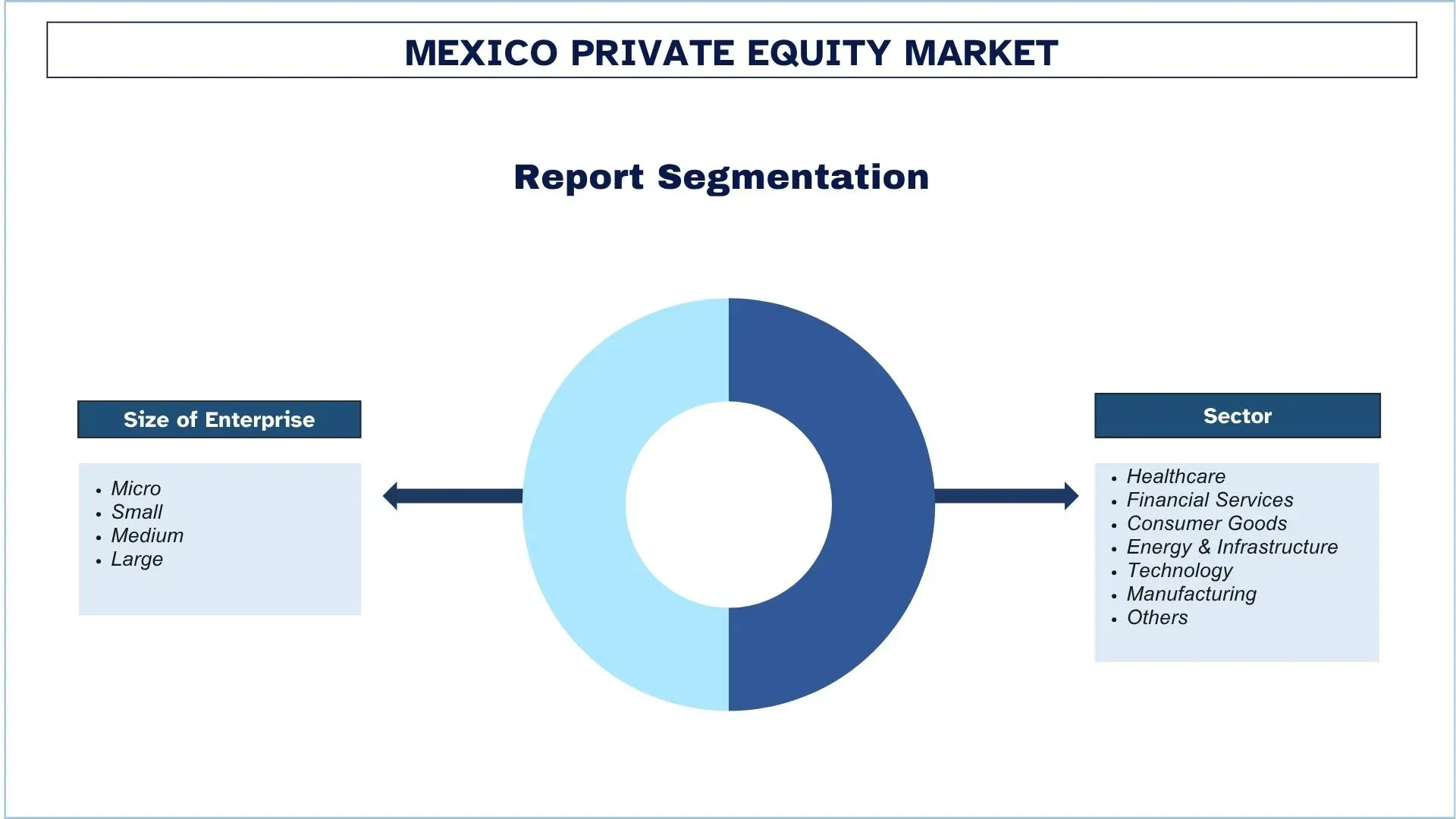
Central Mexico Region will grow the Mexico Private Equity market during the forecast period.
Central Mexico is a crucial part of meth region in the aspect of the private equity of Mexico as it is the place that is being driven towards investments in subjects of the industrial and manufacturing sector, the logistics industry, and technology. The strategic position of the region, which links the export centers in the north with the supply chains of the south, offers the region a high appeal to the domestic and international private equity firms. Important states that provide modern infrastructure, industrial parks, and a skilled labor force are Queretaro, Guanajuato, and Mexico City, and it is these states that have seen their businesses develop rapidly. This has contributed to the increasing trend of medium-sized companies that require growth capital, particularly in the automotive, aerospace, and technology services. Moreover, Central Mexico is a region of a relatively stable business environment and access to regulatory bodies, and is located near capital markets, hence being a prime region when it comes to deal flow within the emerging Mexican private equity landscape.
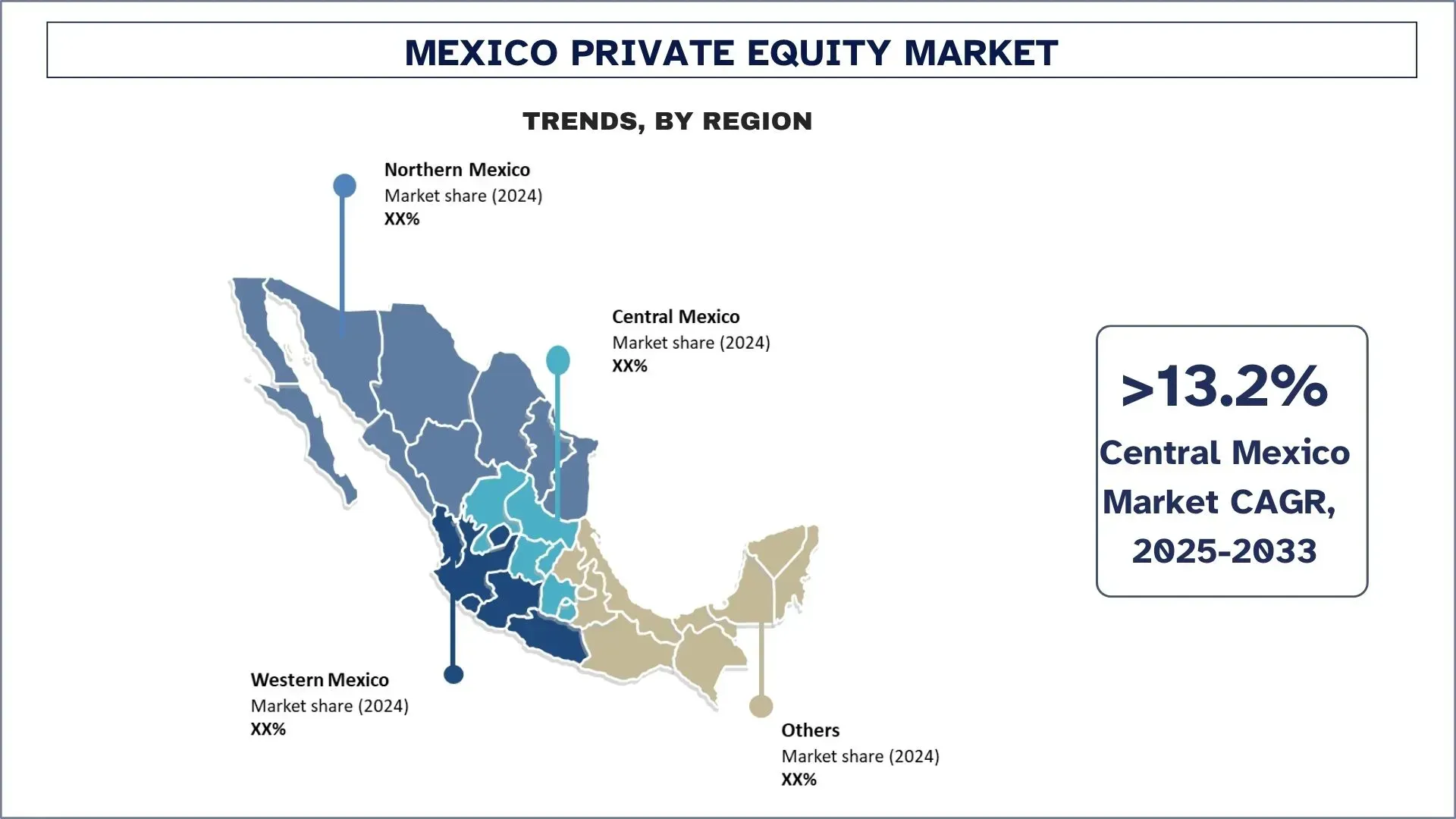
Mexico Private Equity Industry Competitive Landscape
The Mexico Private Equity market is competitive, with several global and international market players. The key players are adopting different growth strategies to enhance their market presence, such as partnerships, agreements, collaborations, new product launches, geographical expansions, and mergers and acquisitions.
Top Mexico Private Equity Companies
Some of the major players in the market are Nexxus Capital, Discovery Americas, Alta Growth Capital, Liv Capital, GBM Private Equity, Hi Ventures, Advent International, Carlyle Group, Southern Cross Group, and Kandeo Private Equity.
Recent Developments in the Mexico Private Equity Market
- TC Latin America Partners recently invested ~$450 million in five industrial sites near the U.S. border with a global institutional investor to expand the development of Class A industrial properties in Mexico.
- In M&A, Hyatt Hotels Corporation announced that Hyatt has entered into an agreement to acquire all outstanding shares of Playa Hotels & Resorts N.V. for $13.50 per share, or approximately $2.6 billion, including approximately $900 million of debt, net of cash. Playa is a leading owner and operator of all-inclusive resorts in Mexico, the Dominican Republic and Jamaica, and Hyatt is currently the beneficial owner of 9.4% of Playa’s outstanding shares.
On the startup front, fintech continues to lead: U.S.-based fintech Tala, which grants small-sized loans to clients in emerging markets, has secured a $150 million debt facility to expand its business in Mexico, reflecting a regional 26% funding increase.
Mexico Private Equity Market Report Coverage
Report Attribute | Details |
Base year | 2024 |
Forecast period | 2025-2033 |
Growth momentum | Accelerate at a CAGR of 11.2% |
Market size 2024 | USD ~9,424.7 million |
Regional analysis | Central Mexico, Northern Mexico, Western Mexico, and Others |
Major contributing region | Central Mexico is expected to grow at the highest CAGR during the forecasted period. |
Companies profiled | Nexxus Capital, Discovery Americas, Alta Growth Capital, Liv Capital, GBM Private Equity, Hi Ventures, Advent International, Carlyle Group, Southern Cross Group, and Kandeo Private Equity |
Report Scope | Market Trends, Drivers, and Restraints; Revenue Estimation and Forecast; Segmentation Analysis; Demand and Supply Side Analysis; Competitive Landscape; Company Profiling |
Segments Covered | By Size of Enterprise, By Sector, By Region |
Reasons to Buy the Mexico Private Equity Market Report:
- The study includes market sizing and forecasting analysis confirmed by authenticated key industry experts.
- The report briefly reviews overall industry performance at a glance.
- The report covers an in-depth analysis of prominent industry peers, primarily focusing on key business financials, type portfolios, expansion strategies, and recent developments.
- Detailed examination of drivers, restraints, key trends, and opportunities prevailing in the industry.
- The study comprehensively covers the market across different segments.
- Deep dive regional level analysis of the industry.
Customization Options:
The Mexico Private Equity Market can further be customized as per the requirements or any other market segment. Besides this, UnivDatos understands that you may have your own business needs; hence, feel free to contact us to get a report that completely suits your requirements.
Table of Content
Research Methodology for the Mexico Private Equity Market Analysis (2023-2033)
We analyzed the historical market, estimated the current market, and forecasted the future market of the Mexico Private Equity market to assess its application in major regions in Mexico. We conducted exhaustive secondary research to gather historical market data and estimate the current market size. To validate these insights, we carefully reviewed numerous findings and assumptions. Additionally, we conducted in-depth primary interviews with industry experts across the value chain. After validating market figures through these interviews, we used both top-down and bottom-up approaches to forecast the overall market size. We then employed market breakdown and data triangulation methods to estimate and analyze the market size of industry segments and sub-segments.
Market Engineering
We employed the data triangulation technique to finalize the overall market estimation and derive precise statistical numbers for each segment and sub-segment of the Mexico Private Equity market. We split the data into several segments and sub-segments by analyzing various parameters and trends, including Size of Enterprise, and Sector, and regions within the Mexico Private Equity market.
The Main Objective of the Mexico Private Equity Market Study
The study identifies current and future trends in the Mexico Private Equity market, providing strategic insights for investors. It highlights regional market attractiveness, enabling industry participants to tap into untapped markets and gain a first-mover advantage. Other quantitative goals of the studies include:
- Market Size Analysis: Assess the current market size and forecast the market size of the Mexico Private Equity market and its segments in terms of value (USD).
- Market Segmentation: Segments in the study include areas of Size of Enterprise, Sector, and regions.
- Regulatory Framework & Value Chain Analysis: Examine the regulatory framework, value chain, customer behavior, and competitive landscape of the Mexico Private Equity industry.
- Regional Analysis: Conduct a detailed regional analysis for key areas such as Central Mexico, Northern Mexico, Western Mexico, and Others.
Company Profiles & Growth Strategies: Company profiles of the Mexico Private Equity market and the growth strategies adopted by the market players to sustain in the fast-growing market.
Frequently Asked Questions FAQs
Q1: What is the Mexico Private Equity market’s current market size and growth potential?
The Mexico Private Equity market was valued at USD 9,424.7 million in 2024 and is projected to grow at a CAGR of 11.2% from 2025 to 2033, driven by Mexico’s strategic nearshoring potential, attracting investment in manufacturing, logistics, and mid-market enterprises.
Q2: Which segment has the largest share of the Mexico Private Equity market by Size of Enterprise?
In 2024, the Medium Enterprise segment dominated the Mexico Private Equity market, as these businesses are increasingly targeted for growth-stage capital and operational scaling opportunities.
Q3: What are the driving factors for the growth of the Mexico Private Equity market?
Key driving factors are:
• Rising nearshoring opportunities due to global supply chain diversification
• Government reforms and investment-friendly policies
• Growing demand for infrastructure, healthcare, and technology investments
• Expansion strategies of international PE firms into Latin America
Q4: What are the emerging technologies and trends in the Mexico Private Equity market?
Emerging technologies are:
• AI-powered deal sourcing and due diligence tools
• Increased use of ESG (Environmental, Social, Governance) frameworks in investment analysis
• Digital transformation in portfolio companies to improve scalability
• Growing interest in impact investing and sustainable private equity funds
Q5: What are the key challenges in the Mexico Private Equity market?
Key challenges are:
• Data privacy and cybersecurity risks in digitalized transactions
• Regulatory complexity and lack of harmonization across Mexican states
• Currency volatility and macroeconomic uncertainties
• Exit strategy constraints due to underdeveloped secondary markets
Q6: Which region dominates the Mexico Private Equity market?
Central Mexico is the leading region, supported by:
• Data privacy and cybersecurity risks in digitalized transactions
• Regulatory complexity and lack of harmonization across Mexican states
• Currency volatility and macroeconomic uncertainties
• Exit strategy constraints due to underdeveloped secondary markets
Q7: Who are the key players in the Mexico Private Equity market?
Some of the leading companies in the Mexico Private Equity Industry include:
• Nexxus Capital
• Discovery Americas
• Alta Growth Capital
• Liv Capital
• GBM Private Equity
• Hi Ventures
• Advent International
• Carlyle Group
• Southern Cross Group
• Kandeo Private Equity
Q8: How are investors capitalizing on growth opportunities in the Mexico Private Equity market?
Investors are focusing on:
• Funding digital, tech-enabled, and ESG-compliant businesses
• Targeting mid-market buyouts and strategic growth equity deals
• Partnering with local VC firms to identify scalable startups
• Investing in supply chain and automation businesses benefiting from nearshoring
Q9: What Regulations are affecting the Mexico Private Equity Market?
Key regulations include:
• Anti-money laundering (AML) and Know Your Customer (KYC) compliance from CNBV (Mexico’s banking regulator)
• Foreign Investment Law updates requiring disclosure and approval for specific sectors
• Data protection frameworks under the Federal Law on the Protection of Personal Data
• Reforms to pension fund investments (AFOREs) enabling more private equity allocations Data
Related Reports
Customers who bought this item also bought



